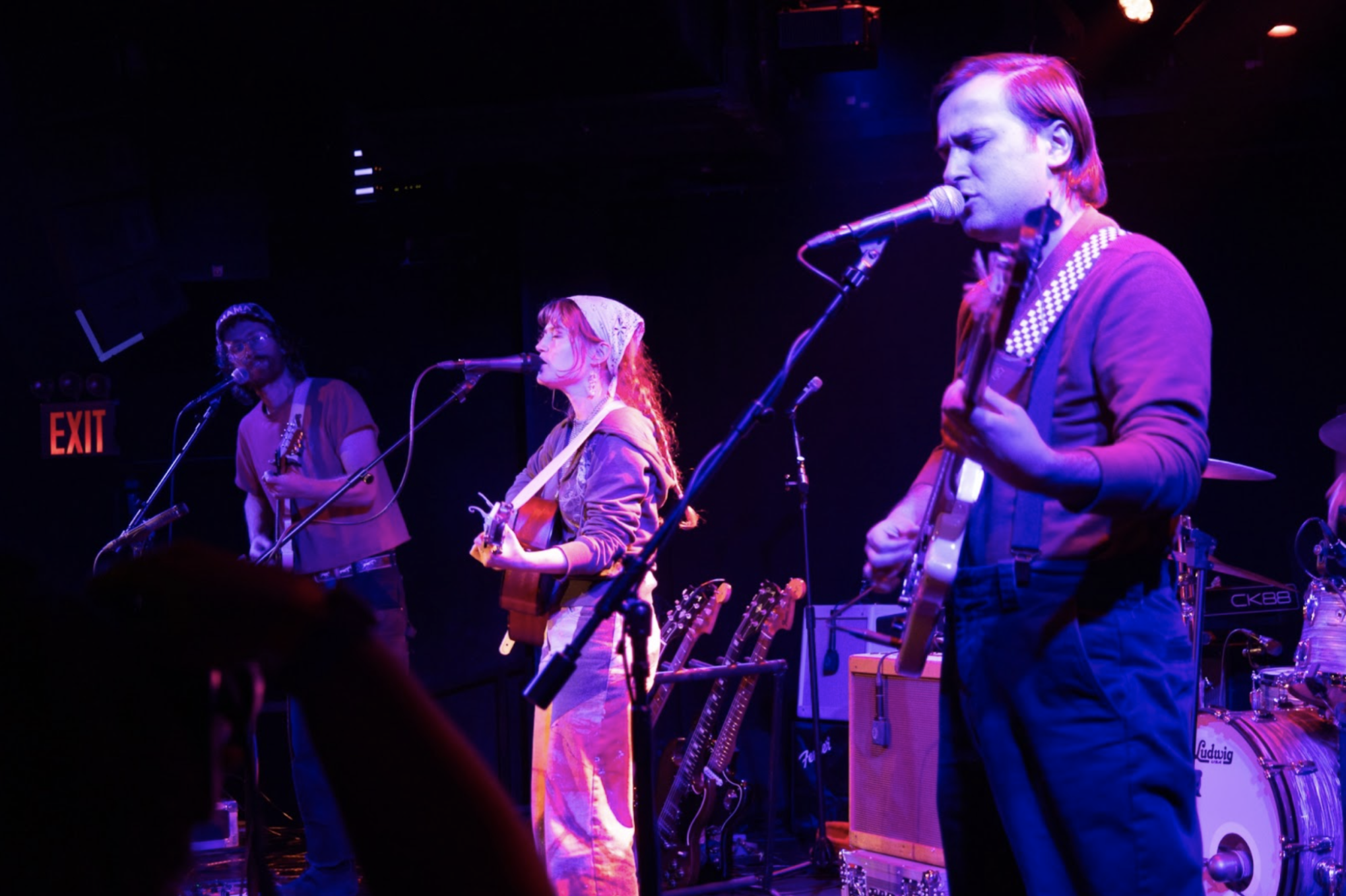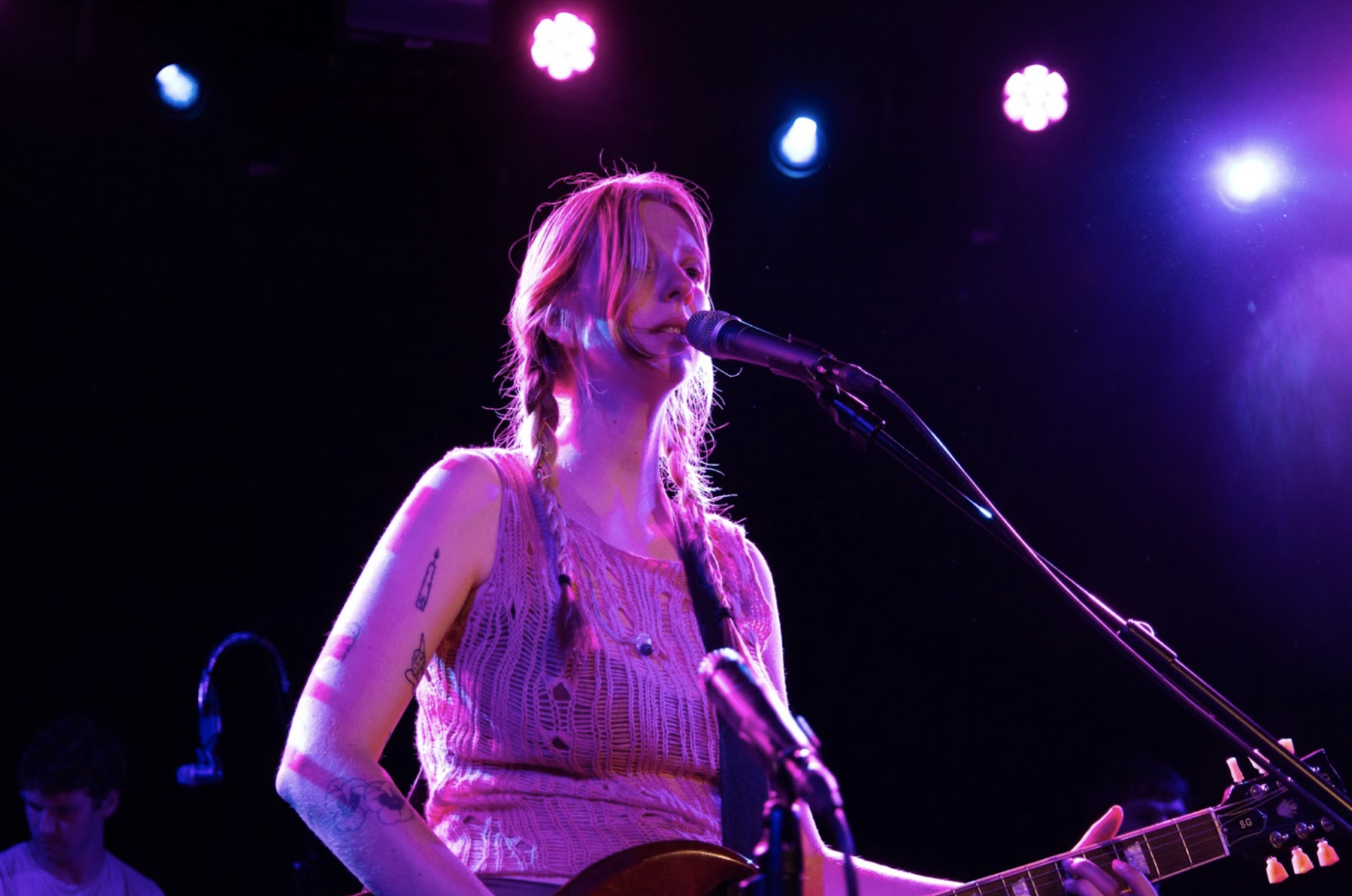
Slow Pulp
Slow Pulp at Le Poisson Rouge, Early November
Slow Pulp performed the way people in Chicago do anything—with their whole heart, focused on being the best they can.
By layla passman
photos by shelby kraut
01.08.2024
When the chill first comes in, it feels too cold to bear. Although it’ll be even colder in a few weeks, the first affront feels especially deep—it forces you to succumb to your own weakness and layer scarves, sweaters, and coats for forty-five-degree weather. Leaving the house becomes a fearful plight of cold air on your cheeks as you wish for the comforts of inside. On the second day that Slow Pulp was in New York, it was my turn to brace myself against the unfamiliar frost. A part of me wanted to call off the excursion to Manhattan, but I was brave and waited in line with others in thick workwear jackets and fingerless gloves. When I got inside Le Poisson Rouge, opener Babehoven was already on stage tuning their guitars.
Babehoven began to play, soft and singular. Lead singer Maya Bon started on her own, playing acoustic guitar to set the scene before the full band joined her. A bandana wrapped around the two unwound braids in her hair like she’d just emerged from a barn or meadow. The music swelled, and I felt warm again. Her voice was sweet, and modest at times, but when the moment was right, she took the song into a deeper place. Babehoven evoked the feeling of growing up in a small Appalachian town, except they live in Hudson, and we were listening in New York City. The person standing next to me was relieved they hadn’t missed the opener and began singing along as soon as they walked through the door, their hands perched on their friends’ shoulders. There’s not often such excitement for the opener as there was for Babehoven; the smile on Bon’s face foreshadowed her appreciation for the growing fan base.

Babehoven
As the set continued, I was reminded of the growing comfort between indie folk and country. Audiences of mainly well-to-do city folk seem to connect to this music more than ever, drawn to a place they’ve never been or a life they’ve never had. It’s this sense of redirected nostalgia that brings people to this new space, feeling like they deserve pastoral simplicity instead of being dealt a more frenetic hand. But as Bon sang, the fantasy became evident and reminded the listener that this life is not devoid of pain. “It’s good to see you / It’s not good to see you,” she sang over and over again until we were in a spiral of her words, remembering the dread of running into someone we’d hoped to see. They closed their set with a transparent call to their merch table, their main source of revenue while touring the country. As a final plea, they asked everyone to follow them on social media and explained how an online following is important for small artists. This was not them begging for attention or followers, but being upfront about the insecurity of being an independent artist today.
I pushed up the front of the crowd, so close I could put my jacket under the stage, and peered at the Snapchats of the girls next to me with X’s on their hands. “California,” the theme song from early-aughts teen drama The O.C., played loudly as Slow Pulp’s lead, Emily Massey, took the stage. She was greeted with cheers as she raised her hands and lip-synced along. A camaraderie grew as everyone sang the off-topic song about a place on the other side of the country. Massey wore an unassuming ensemble of cargo pants and a knit top, an outfit seemingly less calculated than some of those in the audience. Slow Pulp performed the way people in Chicago do anything—with their whole heart, focused on being the best they can, not on how many people recognize or celebrate their efforts. At the end of it, it was just for them. Massey’s presence on stage was just herself, nothing to distract from her own pain, ambivalence, and nostalgia. While soft, her voice was still confident. She sang “love you always” so vast that I could see all the way into her throat. I was reminded that music can just be good—it doesn’t need to be arty, unconventional, or boundary-pushing. Sometimes, music can be the only window to basking in pleasantness.

Slow Pulp
Maya Bon joined Slow Pulp on stage for “Falling Apart,” the song that Spotify had been algorithmically feeding most likely everyone in the room. I knew all the words without even thinking, like a song that’s been stuck in your head but you’re not sure why. Massey asked if anyone else was on their period and was met with cheers from her compatriots as she began “Cramps,” a song aptly named for just that. For their song “Broadview,” Massey surprised with a harmonica, folding in another folk motif. This time, I was reminded of folk’s urban origins. Maybe this spill into rock doesn’t come from wistful aspiration, but rather, a creation or homage to the places we’re already in. Slow Pulp waited to play their most popular song, “High,” as an encore. The crowd anticipated the loudness as Massey eagerly counted everyone into the chorus, a final exchange of all that was left of the night. Though this felt final, the band gave one last encore: a song about leaving home and growing up, only to feel the twinge of remembrance when your old house is sold. You thought you carried the memories with you, but now without a physical reminder, a part of you feels lost. Their last song served as a reminder that whether we leave home to dream, or dream of leaving the home we have made, we’ll never forget the parts we’re made from.
